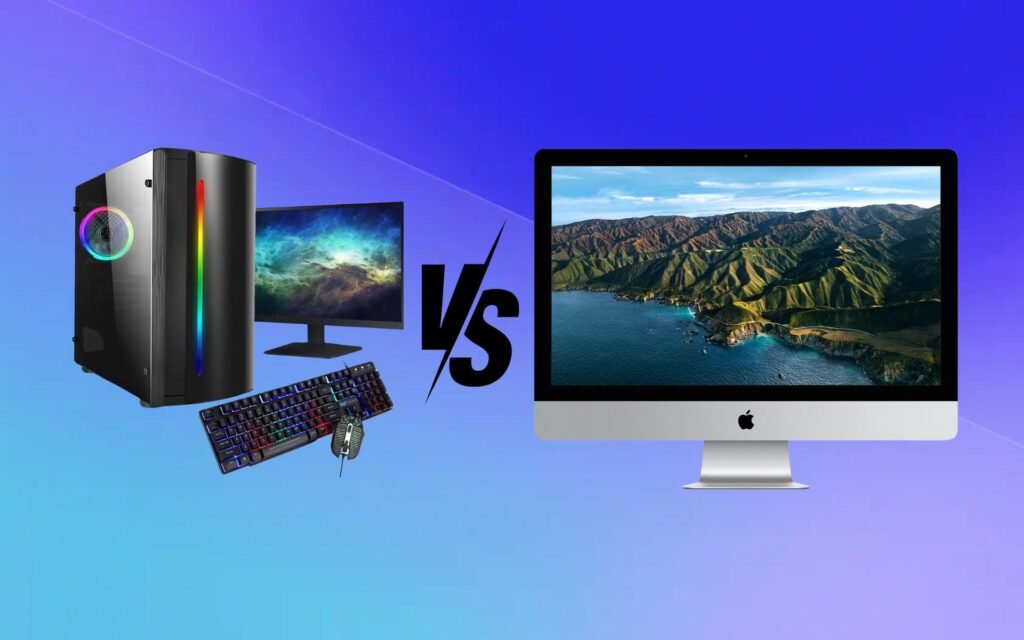Mac vs. Windows Computers: Which is Right for You?

Choosing between Mac and Windows computers is one of the most debated topics in the tech world. Both systems have their strengths and weaknesses, catering to different needs and preferences. This detailed guide explores their key differences to help you make an informed decision.
1. Overview of Mac and Windows Systems
- Mac (macOS): Developed by Apple, macOS is known for its premium design, seamless integration with other Apple devices, and user-friendly interface. It powers Apple’s MacBook and iMac series.
- Windows: Microsoft’s Windows operating system is more ubiquitous and runs on a wide variety of hardware from different manufacturers like Dell, HP, Lenovo, and ASUS. It offers extensive customization and compatibility.
2. Design and Build Quality
- Mac: Apple products are synonymous with elegant design and superior build quality. MacBooks are crafted from aluminum, providing a sleek and durable finish. The Retina display on Macs offers crisp and vibrant visuals, making them ideal for professionals in creative industries.
- Windows: With a wide range of manufacturers, Windows laptops and desktops vary significantly in design and build quality. Some models, like Microsoft’s Surface or Dell’s XPS series, rival MacBooks in aesthetics, but budget-friendly options may compromise on materials and durability.
3. Operating System and User Interface
- macOS: Known for its clean and intuitive interface, macOS excels in simplicity. Features like the Dock, Mission Control, and Spotlight Search enhance productivity. macOS updates are less frequent but generally more stable and user-friendly.
- Windows: Windows offers a more customizable interface. The Start Menu, Taskbar, and File Explorer provide flexibility for both novice and advanced users. Frequent updates ensure new features and security patches but can occasionally cause compatibility issues.
4. Software and Application Support
- Mac: macOS is favored by creatives, with industry-standard software like Final Cut Pro, Logic Pro, and Sketch exclusive to the platform. However, it may lack compatibility with some niche or legacy applications.
- Windows: Windows boasts broader software compatibility, including extensive support for games, business applications, and specialized software. It’s often the go-to platform for industries requiring custom or legacy programs.
5. Performance and Hardware Options
- Mac: Macs are optimized for performance, with Apple’s M-series chips (M1, M2, and beyond) delivering impressive speed, efficiency, and battery life. However, hardware configurations are limited to what Apple offers.
- Windows: Windows PCs come in a wide range of configurations, from budget-friendly models to high-performance machines. Users can choose powerful processors, GPUs, and storage options to fit their needs. Custom-built PCs offer even greater flexibility.
6. Gaming
- Mac: Gaming is not a strong suit for Macs. While the hardware is capable, macOS lacks extensive support for popular games, and most titles are optimized for Windows.
- Windows: Windows dominates the gaming world with better hardware options, software optimization, and compatibility with popular gaming platforms like Steam and Epic Games.
7. Security and Privacy
- Mac: macOS is less targeted by malware, making it generally more secure. Apple’s strong emphasis on user privacy also gives it an edge.
- Windows: While Windows faces more security threats due to its market share, Microsoft has significantly improved its security features with tools like Windows Defender. Users need to be proactive in maintaining security.
8. Price
- Mac: Apple products come with a premium price tag. While the high initial cost is offset by durability and resale value, Macs are not ideal for budget-conscious buyers.
- Windows: With a wide range of options, Windows computers cater to all budgets. You can find affordable laptops as well as high-end machines.
9. Ecosystem and Compatibility
- Mac: If you use other Apple devices like iPhone, iPad, or Apple Watch, the macOS ecosystem offers seamless integration. Features like Handoff, AirDrop, and iCloud create a cohesive user experience.
- Windows: Windows PCs integrate well with Android devices and third-party peripherals, providing more flexibility for users who prefer non-Apple gadgets.
10. Who Should Choose Mac?
- Creative professionals like graphic designers, video editors, and musicians.
- Users heavily invested in the Apple ecosystem.
- Those who prioritize design, stability, and ease of use over customization.
11. Who Should Choose Windows?
- Gamers and those requiring high-performance hardware.
- Business users relying on niche or legacy software.
- Budget-conscious buyers seeking a wide range of options.
The choice between Mac and Windows ultimately boils down to personal preferences and specific needs. Macs are best for users seeking premium design, seamless integration, and creative software. Windows PCs, on the other hand, offer versatility, customization, and a broader range of options for various applications.


